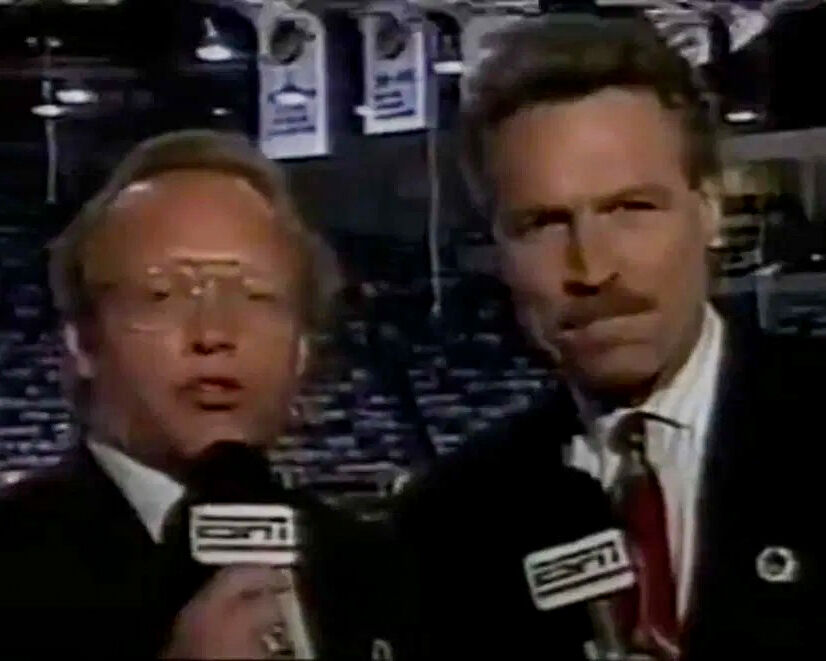The last time an NHL game on ESPN ever aired was June 9, 2004, when the Tampa Bay Lightning beat the Calgary Flames to win their franchise’s first-ever Stanley Cup. After that, the league did not renew its TV contract with ESPN. The entire 2004-05 season was canceled due to a lockout between the players and the owners over a revenue dispute. Since then, it’s been a long journey through the wilderness for hockey. When the league returned in the fall of 2005, they had a brief but embarrassing stint on the Outdoor Living Network, later rebranded at the Versus Network, which itself later became the NBC Sports Network. The NBC deal was moderately successful for the NHL, but the network didn’t do much to promote the league outside of airing its games, and they struggled to gain prominence in a changing media landscape.
ESPN is, in many ways, an “influencer” of sports culture; what they talk about on their shows, like SportsCenter, First Take, and others influences what the culture at large talks about. Can LeBron and the Lakers repeat? Will the Patriots’ free-agent splurge get them back into contention? Are the Texans actually dumb enough to trade Deshaun Watson? But you almost never hear things like, “Are the Lightning the odds-on favorite to repeat as Stanley Cup champions?” “Are the Maple Leafs improved enough to make a deep playoff run?” “Are the Islanders for real, or just a regular-season novelty?”, et cetera, et cetera.
It was revealed earlier this month that the NHL had signed a new, seven year deal with ESPN for TV, streaming, and media rights. Among the many perks, it includes giving sole coverage of the Stanley Cup Final to ESPN’s broadcast partner ABC for four of the next seven Stanley Cup Finals, about 25 regular-season games per year on ESPN or ABC, as well as a number of games on their streaming services like ESPN+ or Hulu. Beyond the $400 million a year that ESPN is paying the league for the TV rights, which will undoubtedly send league revenues skyrocketing, leading to increased team values, a higher salary cap, and bigger contracts for the players, this is a terrific deal that will give the NHL some desperately needed national exposure in the U.S.
While I doubt that Stephen A. Smith and Max Kellerman will be having any lively debates about whether Auston Matthews or Alex Ovechkin is the best goal scorer in the NHL, the money that ESPN is paying will force them to at least mention the NHL more often than basically never (as was the case for almost 20 years). One of the NHL’s biggest problems has not only been a lack of national exposure, but a chronic inability to market their star players. Part of this is due to the sport of hockey’s team-first mentality, and the old adage, “It’s about the logo on front of the jersey, not the name on the back.”
Think of the biggest stars in the NBA: LeBron James, Kawhi Leonard, Kevin Durant, Giannis Antetokounmpo, etc.; those guys aren’t just stars, but brands in their own rights. As someone who has traveled to multiple continents, I can tell you for a fact that people around the world know who those guys are, regardless of whether they actually watch basketball or not. As far as the average American might know, Edmonton Oilers superstar Connor McDavid might as well be the Canadian secretary of agriculture. For a sport that struggles to give “highlights” to a general public that increasingly thrives on quick, 30 second Twitter videos, or even shorter TikToks or Snapchats, having the worldwide leader’s massive social media apparatus behind them cannot be seen as anything but a positive.
ESPN will begin airing NHL games in the fall of 2021. While one can only guess what the hosts or presentation will look like, I only request two things: 1) That awesome theme music (if you’ve heard it, you know what it is), which would get you instantly pumped for some nighttime NHL action; and, 2) The indispensable Gary Thorne. The man whose voice narrated so many of the most significant moments in NHL history: Wayne Gretzky passing Gordie Howe for the most goals in NHL history, Mario Lemieux’s first goal in his first game back from his battle with cancer, Steve Yzerman’s double-overtime goal in the 1996 Western Conference semifinals, and countless others. Re-engaging with the worldwide leader might end with being one of the best things that ever happened to the NHL. You might say they never should’ve left in the first place.

